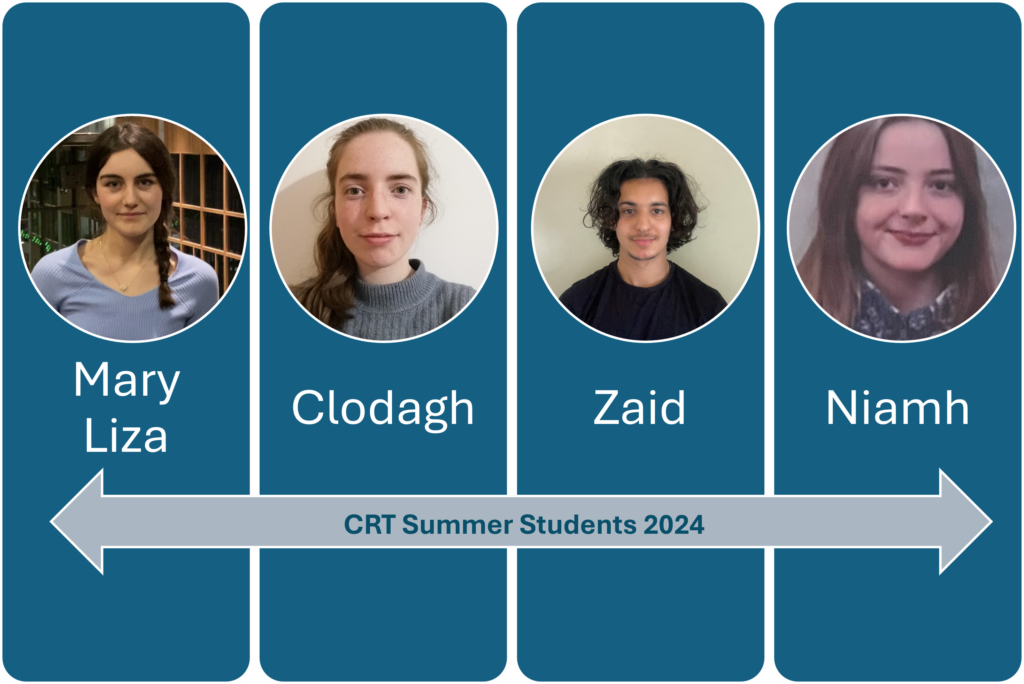For summer 2024 the CRT provided 4 summer scholarships at the University of Galway for undergraduates with an interest in pursuing a career in research related to Genomics Data Science.
These competitive scholarships provided 3rd year students with the opportunity to do a 6-week project with a CRT supervisor and aimed to:
- Develop students research skills by giving them the opportunity to undertake a short research project.
- Enable students to understand how their skills can be applied in a research environment.
- Provide training and supervision so they develop new skills and specialist knowledge.
- Stimulate their interest in a career in genomics data science.
As an output the students were asked to create a short video presentation about their research project suitable for a lay audience. Please see below for a short description of each project and the link to the students presentation.
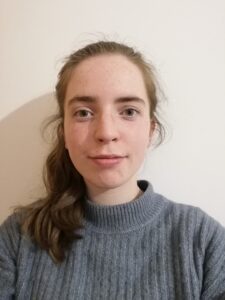 Clodagh Gormley has just finished her 3rd year in Biomedical Science at the University of Galway. Clodagh did a 6-week project on “Reassessing the Origin and Evolution of Flightless Birds” under the supervision of Dr Lars Jermiin. Her research project re-examined mitochondrial genomes from 32 species of birds using new bioinformatics tools, developed by Jermiin and collaborators, including a superior phylogenetic protocol, better statistical tests, and flexible model-based phylogenetic methods that can model heterogeneity of the evolutionary process across lineages and across sites. Clodagh’s results aligned with earlier studies suggesting that flightless birds lost their ability to fly independently through a combination of genetic changes influenced by the absence of predators, an abundance of food and their need to adapt to specific environments and she also found that Elephant birds are the closest relatives of Kiwi’s.
Clodagh Gormley has just finished her 3rd year in Biomedical Science at the University of Galway. Clodagh did a 6-week project on “Reassessing the Origin and Evolution of Flightless Birds” under the supervision of Dr Lars Jermiin. Her research project re-examined mitochondrial genomes from 32 species of birds using new bioinformatics tools, developed by Jermiin and collaborators, including a superior phylogenetic protocol, better statistical tests, and flexible model-based phylogenetic methods that can model heterogeneity of the evolutionary process across lineages and across sites. Clodagh’s results aligned with earlier studies suggesting that flightless birds lost their ability to fly independently through a combination of genetic changes influenced by the absence of predators, an abundance of food and their need to adapt to specific environments and she also found that Elephant birds are the closest relatives of Kiwi’s.
A video where Clodagh presents her work can be found here.
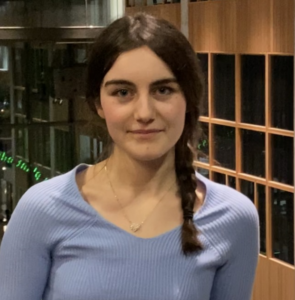 Mary Liza Gannon is studying Genetics and Genomics at the University of Galway and is going into her final year. Mary Liza did a 5-week summer project with Prof Derek Morris on “Investigating FOXP1-regulated genes in schizophrenia”. Schizophrenia is a mental illness with a genetic basis that impacts cognitive function. FOXP1 is a risk gene for schizophrenia and its role may be mediated by its function as a transcription factor that organizes brain during development, where it regulates the functions of hundreds of other genes. The aim of Mary Liza’ s project was to identify FOXP1-regulated genes from knock-out animal models and investigate their influence on schizophrenia. She performed RNA-seq analysis of gene expression data from FOXP1 knock-out animal models and investigated whether FOXP1-regulated genes are specifically influencing different domains of the schizophrenia phenotype as well as trying to understand if biological processes controlled by FOXP1 could become targets for new drug development.
Mary Liza Gannon is studying Genetics and Genomics at the University of Galway and is going into her final year. Mary Liza did a 5-week summer project with Prof Derek Morris on “Investigating FOXP1-regulated genes in schizophrenia”. Schizophrenia is a mental illness with a genetic basis that impacts cognitive function. FOXP1 is a risk gene for schizophrenia and its role may be mediated by its function as a transcription factor that organizes brain during development, where it regulates the functions of hundreds of other genes. The aim of Mary Liza’ s project was to identify FOXP1-regulated genes from knock-out animal models and investigate their influence on schizophrenia. She performed RNA-seq analysis of gene expression data from FOXP1 knock-out animal models and investigated whether FOXP1-regulated genes are specifically influencing different domains of the schizophrenia phenotype as well as trying to understand if biological processes controlled by FOXP1 could become targets for new drug development.
A video where Mary Liza presents her project can be found at Mary Liza Gannon- research project
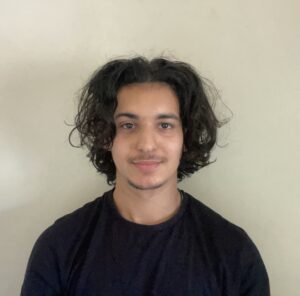
Zaid Abu Diak has just finished his 3rd year studying Biomedical Science at the University of Galway. Zaid did a 6-weeek project on “”Evolutionary Dynamics and Expression Analysis of DBF4 and DBF4B Genes in Eukaryotes” under the supervision of Prof Corrado Santocanale and Dr Lars Jermiin and mentored by CRT student Stefanus Bernard. His research project provided valuable insights into the evolutionary history and structural divergence between the DBF4 and DBF4B genes. The findings indicate that DBF4B probably emerged during the Dipnotetrapodomorpha divergence, which occurred approximately 415 million years ago. The BRCT and Zinc finger domains were highly conserved between the two genes however, there were distinct substitutions between them and there was an absence of a conserved C-terminal domain which is present throughout all the DBF4 sequences across species. The conservation of specific domains in DBF4B indicates that it still plays a key role in cellular processes, warranting further investigation to fully comprehend its evolutionary significance.
A video where Zaid presents his work can be found at Zaid Summer Project – DBF4
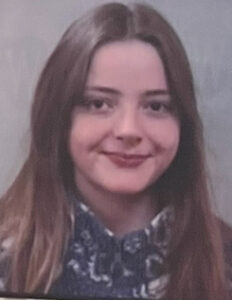 Niamh McCarthy is studying Microbiology at Trinity College Dublin and is going into her final year. Niamh did a 6-week project on “Reconciling antimicrobial resistance phenotypes and genomic predictions in diarrhoeal pathogens“” under the supervision of Dr Matthew Dorman at the University of Galway. Her project used publicly available genomic data from the online database, Pathogenwatch giving her instant access to over 6000 Vibrio cholerae genomes, which is the causative agent of the disease cholera. While severe cholera cases are treated with antibiotics, resistance to these treatments is becoming increasingly common. Genomic surveillance can help track and monitor the spread of antibiotic resistance genes between different strains, both locally and globally. In her project, Niamh focused on identifying discrepancies between predicted antimicrobial resistance from genomic data and observed phenotypes, highlighting strains of interest. Additionally, she aimed to identify trends in these discrepancies, particularly those related to the inclusion or absence of certain resistance genes in prediction databases.
Niamh McCarthy is studying Microbiology at Trinity College Dublin and is going into her final year. Niamh did a 6-week project on “Reconciling antimicrobial resistance phenotypes and genomic predictions in diarrhoeal pathogens“” under the supervision of Dr Matthew Dorman at the University of Galway. Her project used publicly available genomic data from the online database, Pathogenwatch giving her instant access to over 6000 Vibrio cholerae genomes, which is the causative agent of the disease cholera. While severe cholera cases are treated with antibiotics, resistance to these treatments is becoming increasingly common. Genomic surveillance can help track and monitor the spread of antibiotic resistance genes between different strains, both locally and globally. In her project, Niamh focused on identifying discrepancies between predicted antimicrobial resistance from genomic data and observed phenotypes, highlighting strains of interest. Additionally, she aimed to identify trends in these discrepancies, particularly those related to the inclusion or absence of certain resistance genes in prediction databases.
A video where Niamh presents her works can be found at Niamh McCarthy_research project


